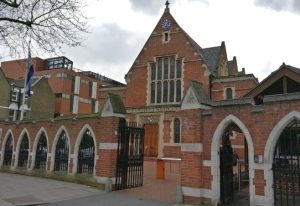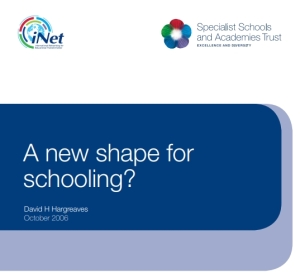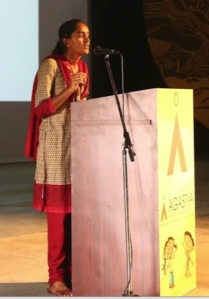Originally posted on BEE-IT in November, 2016
There have been a few things I have been passionate about during my many years in education. Some of these enthusiasms have waxed and waned, but one of the longest serving has been a firmly-held belief in the power and place of student voice.
So when I read appalling tosh on the subject of Student Voice from normally sensible folk, such as Tom Bennett’s piece in the TES, I can get quite cross. Especially because Tom is insightful and positive about so many things that this seems an odd lacuna in his world view. But here, even where he finds evidence of value in student voice (“Interestingly, student evaluation of teachers has been found in some studies to more accurately predict grade outcomes (and by proxy, teacher quality) than graded lesson observation”) he has to add an immediate put down (“… but given that the latter is as reliable as reading tea leaves, I don’t think the bar is high”). In fact, I got cross enough to rouse myself from autumnal slumbers to write this piece. And no apologies for a cathartic, anecdotal-laden account of why I believe student voice has shown itself to be so important to education! . Which mostly seems to involve discussions in various Headteachers’ offices…
Sixties flashback…

It’s always hard to pin down the origins of a long-held belief, but my earliest real memory of the importance of student voice dates back to own schooldays. These were of course in black and white, and in the Sixties, at just about the time they began to swing. One day a dozen or so of us lower sixth formers (Year 12 in new money) were summoned to the Head’s study, an exceedingly rare occurrence. “You have been chosen to take a third year sixth, and to sit Cambridge entrance exams. You will apply to Fitzwilliam College, where I have excellent contacts, and those of you that do well enough in your exams I know will be offered a place.” Then we were ushered out again. No discussion or questions.
Now I was a northern, working-class lad with ambitions, but I already knew that I had absolutely no desire to attend Oxbridge. Enough news had filtered back, from boys from the years above, about how us northern oiks were treated there, to rule Oxbridge out in my book. But the Head’s decrees in those days were also absolute. He was understandably keen to boost the school’s standing in those pre-league tables days, and for many folk Oxbridge entries were seen as a key metric. And the Head’s word was law, never questioned, so that was that.
But hey, the Beatles had just been invented, revolution was in the air, and about half a dozen of us wanted to register our opposition. I inadvertently became the ‘ringleader’ by being the one who knocked on his study door. Another first, though we had of course checked in with his secretary and been advised when it was OK to do so. ‘I am not in the habit of taking deputations’, he boomed, ‘you front three come in, be off with the rest of you’. I stammered out our unwillingness to go to Oxbridge, on behalf of our little rebellious gang. ‘Nonsense’, he said, ‘none of you know what you are talking about, or what’s best for you, of course you are doing the third year sixth and applying to Cambridge’. Most of the group folded, but three of us resisted, which got us blackballed when prefect selection came up. But we still held out.
Well, we had to do a third year sixth, as the Head point-blank refused to give us references to other universities that would allow us to apply in the second year, along with our peers. No reference, no entry – absolute power, and he thought we’d weaken. Even said as much to my mother, when she served him in the shop where she worked.
I was grudgingly allowed to become a prefect after good A level results, but I still refused to sit the Cambridge Entrance Exams, or go to the special coaching (think ‘History Boys). I duly went off to Durham University, with his criticisms for my daring to express a contrary opinion and challenge his authority still rankling. His conviction that students did not know what was best for them in such matters was sincerely held, but in my view appallingly misguided and patronising. Disdain for student voice often is just that.
Indulge me in a little smugness here, for after three glorious years at Durham and a First, a summertime chat with some of my Cambridge contemporaries revealed two nervous breakdowns, one attempted suicide, some very miserable stories and a smattering of 2.1s/2.2s by people that I knew were far smarter and brighter than I was.

Of course, some had succeeded. One of those peers three years earlier, and Head Boy to boot, who was happy to be going to Fitzwilliam, Cambridge was Vince Cable, and a quick glance at Wikipedia or the TV reveals that he seemed to do OK. But I still believe that I knew what would suit me better than did the Head, and had learned that student voice has a real place, and a legitimacy. I had also learned that Heads may sometimes do what is in the school’s best interest, rather than that the pupils.
A loud report…

When I finally left Durham, after a couple more qualifications, I ended up learning the secondary teaching trade in West London. After a couple of years my teaching was transformed by a great idea from a colleague, the Head of History. One day when writing reports, one of his Year 9s challenged him about why teachers always wrote reports on pupils, but never pupils on teachers. ‘OK’, he told the lad, ‘put together a class report on my teaching’. A couple of weeks later, down the pub, he told us just what an eye-opener the resulting report had been. They had picked up on both the strengths and weaknesses that he had recognised in his own teaching. More crucially, they made him aware which of these they could live with, and which really got in the way of their learning.
So the next term a small group of us teachers got some of our own classes to write reports on us. Getting a single combined report from the form seemed to help them to take it seriously, and cut out the stupidity that individual anonymous reports could generate. And from my classes I also learned a huge amount about my own pedagogical strengths and failings. The students were perceptive, frank but entirely fair.
At the next staff meeting the Head made a short announcement. ‘It has come to my attention that some of the staff have been getting their classes to write reports on their teaching. This practice will stop now’. I had the temerity to ask why, as I had found it so beneficial. ‘Go to my office NOW. This meeting is over’, came the reply, which rather shocked most of the gathered staff, especially yours truly, since the Head wasn’t normally so abrupt, and usually encouraged discussion.
I duly went and stood somewhat chastened at his office door. He followed in seconds, and ushered me in. ‘Do sit down, would you like some tea?’ he asked, beaming. Taken aback, I said ‘Yes’, and sat, awaiting the inevitable dressing down to follow. When his secretary had poured the teas, and left the room, he turned to me, still beaming and said something along the following lines. ‘You are wondering why I, who you believed to be a kind and liberal head, has just shut you up and humiliated you in such a way. You did not expect it, and I am going to explain my reasons, though this is a conversation that has not taken place, if anyone asks.’
‘Firstly I know from my own experience that this student feedback is a powerful and effective tool to help improve your teaching. I believe you when you say it taught you a lot about yourself and your practice, as it did your colleagues. I have had a long chat with [the Head of History] about this too. But I am the Head here, and I have a school to run. I have innumerable conversations with pupils, and sometimes their parents, about the teaching that goes on in this school. I can tell you now that around 25% of the staff in this school could not bear to hear what their pupils really think of them. I owe a duty of care to those teachers as much as to the rest of the staff, the pupils and their parents, and I need to keep this school running. So it is for that reason that I am banning this idea, before the pupils start demanding the right to write reports on ALL their teachers.’ We then had a nice chat about what I had learned from the reports, and he was his usual supportive self thereafter.
Two valuable lessons for me from that experience. One on the power and effectiveness of pupil voice, and the other I believe was probably my first real insight into what school leadership was really about. It also helped explain why the Sixth Form Council that was set up a year or so later, that I have written about elsewhere, was cunningly contrived to pay lip service to student voice while making sure the staff were in the majority when it came to voting. I learned a lot from that Head. But it has always left wondering whether those who are so resistant to student voice are partly driven by a secret fear of what students may think of their teaching, or, of course, it could just be simple ‘teacher knows best’ arrogance? Or probably a much more complex mix … ‘It’s complicated’.
Opening the gateway to the deep…
 When much later, when I worked at SSAT, I was delighted to find that in the 21st century recognition of Student Voice had moved forward significantly. The co-constructed work from Prof David Hargreaves, collaborating with hundreds of school leaders, identified Student Voice as one of the nine ‘gateways’ to school transformation.
When much later, when I worked at SSAT, I was delighted to find that in the 21st century recognition of Student Voice had moved forward significantly. The co-constructed work from Prof David Hargreaves, collaborating with hundreds of school leaders, identified Student Voice as one of the nine ‘gateways’ to school transformation.
Lots of schools produced evidence of real school improvement and development of deep learning through utilising student voice, alongside ‘learning to learn’ and ‘assessment for learning’. That Redesigning Learning programme, well over 10 years ago now, was one of the most rewarding activities in which I have been engaged, and much of it is still available online for those prepared to read about the real impact of student voice. Excellent stuff, you can read about it yourself, so I need say no more.
Students on interview panels
Some of those responding on social media to Tom’s student voice hatchet piece spoke equally scathingly of students being on interview panels for teaching appointments. Again my own experience of this has been entirely positive, and the exact opposite of their sarcastic remarks. Asked to be an external member of an interview panel for a headship appointment, where the school had made a major investment in ICT, I was pleased if surprised on the day to find two pupils also co-opted onto the panel.
The field for the headship was sadly not very impressive, but one candidate seemed to impress most of the panel, though I had been disappointed with his responses on my ICT questions. But a student’s question, around care and well-being of pupils, clearly threw him totally, and produced a woeful response. To me this revealed someone not ready for headship, lacking the essential wider view of what was involved in leading a school. Sadly this poor response was ignored by the interview panel, who rather disregarded the students opinions in the final discussions, and the candidate was duly appointed. Only to resign a year later having not only totally failed to carry the school forward, but seeing it fall back towards the confusion and poor results from which it had been emerging. Which could normally have been heralded a win for student voice, except there are no winners in such circumstances. A school that had been nurtured out of special measures, by a combination of student voice and transformed pedagogy, slipped back down into problems again.
The Head of a wonderfully successful Birmingham primary once told me that the Year Six members of his teacher interview panels had by far the best track record when it came to spotting the successful recruits to his staff. ‘I think it is because they are really good at picking up which applicants genuinely care for the children they will be teaching’ was his verdict. Mind you, that school also had year 3 pupils helping teach year 2 pupils the things that they themselves had learned the year before, and of course inevitably reinforcing their own learning at the same time. So much for all that social media sarcasm about students not being in a position to comment on teaching!
An international view
 The latest and probably most powerful argument I have encountered for student voice was meeting the Student Instructors while I was at the Agastya Maverick Teachers Global Summit in India in 2016.
The latest and probably most powerful argument I have encountered for student voice was meeting the Student Instructors while I was at the Agastya Maverick Teachers Global Summit in India in 2016.
Each evening pupils gathered in the local village schools for homework sessions, which are mainly run by the older students. The most capable that learn well and speak out in class can train to become student instructors. Peer learning and student voice, writ large and impressively. On some occasions older students who had done well, and left the village to attend college or even university, will return to work with these student instructors. One of these instructors spoke to the whole MTGS event, and for many was one of the highlights of the week. Tears and cheers in equal measure. We all expect her to be running for state politics, on the student voice ticket, any day soon.
This application of student voice has a most powerful enabling and motivational impact on the other children. They have few resources, but the approach fuels wonderful motivation for learning and improvement, as well as offering instructional support. Maybe these students could be the bridging point between my position and the student voice sceptics, since many of the sceptics seem to share a huge passion for direct instruction approaches? But maybe the naysayers belief that students are not in a position to have any say in pedagogy, as they are not well enough informed, will prevent such a bridge ever being built?
LINKS:
Tom Bennett: ‘Asking students to observe lessons? You may as well ask the class hamster about the best way to teach phonics’ | TES https://www.tes.com/news/school-news/breaking-views/asking-students-observe-lessons-you-may-well-ask-class-hamster-about
Uniformly inconsistent : Tony Parkin http://bee-it.co.uk/blogs/uniformly-inconsistent/
SSAT: A New Shape for Schooling: Prof D Hargreaves (2006) PDF http://bit.ly/2g77yi1
SSAT: Student Impact in the Redesigned School (2013) https://webcontent.ssatuk.co.uk/wp-content/uploads/2013/09/RS5-Student-impact-chapter-one.pdf

